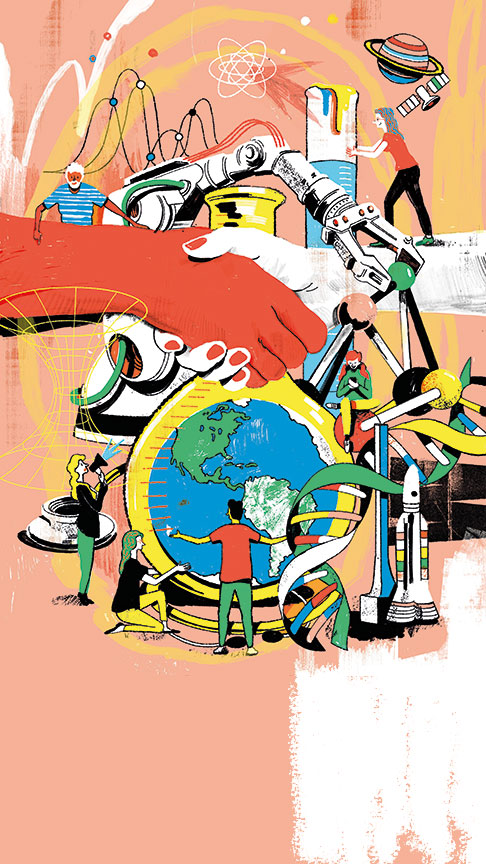“This is not a political issue” John Kerry, a former secretary of state and the first US special envoy for climate change, told his counterparts in China during a visit to discuss climate change in July 2023. “We’re not involved in dictating anything to anybody. And if anything, the science dictates the parameters that we all need to live by.”
As the political and diplomatic relations between the two countries have declined, the US administration has brought in climate diplomacy not only to combat global warming but also to resolve strategic issues, such as trade, surveillance and the Taiwan crisis. The weather in China, or so the US administration thought, was on Kerry’s side. During the meeting with China’s Premier Li Qiang, Kerry put on the table a report of a 52°C (125.6°F) temperature reading in China a few days earlier. The report offered compelling, scientific proof of the urgency to persuade China to decrease greenhouse gas emissions and cut down on coal plants. The Chinese reaction was immediate. Li Qiang simply questioned the source and resumed the discussion.
John Kerry is a seasoned negotiator. He was among those who negotiated agreements restricting Iran’s nuclear programme and the one who signed the 2015 Paris Agreement on climate change on behalf of the US. As the Russian war in Ukraine has forced the redrawing of the global geopolitical map, national foreign science policies face novel challenges: from climate change and the role of artificial intelligence to the reemergence of the nuclear threat and deadly pandemics. “Science diplomacy” is the term that, at least over the last two decades, captures the influence and decisive role of both science and technology in international affairs as well as their role in resolving international conflicts. In other words, through the use of science to address global challenges (such as climate change or the war in Ukraine) or to bring deadlocked diplomatic negotiations (such as the Iran nuclear deal) back on track, science diplomacy figures prominently in international relations.
Simply put, science diplomacy frequently aims to influence the policy of another country in ways favourable to the first country by using science as a major tool. But how does this work in practice and is science really as exceptional and objective as policy advisors like to argue? Which comes down to the question: what is the diplomatic power of a temperature reading?
Despite the high expectations, Kerry returned from China empty-handed, as The New York Times reported, without having been invited to meet the Chinese President Xi Jinping. Instead, it was Henry Kissinger, the 100-year-old premier diplomat and former US secretary of state, who had the honour of meeting Xi Jinping at the Diaoyutai State Guesthouse in Beijing a day after Kerry’s departure. Nobody can confirm who invited or sent Kissinger to Beijing. Yet China’s Foreign Minister Wang Yi referred during this visit to Kissinger as the diplomat who “made historic contributions to breaking the ice in China-US relations” more than half a century ago, playing an “irreplaceable” role in enhancing understanding between the two countries. Indeed, in 1971 Kissinger flew from Pakistan to Beijing to secretly negotiate and prepare US President Richard Nixon’s 1972 visit to China. In his memorandum to Nixon on the day of his return to the US, Kissinger reported on a visit to a hospital where he was introduced to the ancient Chinese practice of acupuncture. There he witnessed three major surgical operations where the patients’ anaesthesia was induced by the application of acupuncture needles. Kissinger was astounded by this “beyond the ordinary” experience of a diplomatic envoy to a foreign country. Evidently, the acupuncture needle became one of the most important diplomatic tools, changing the history of China-US relations and impacting global international affairs. Throughout the 1970s this aspect of “communist science” fascinated the American public and paved the way for the “diplomacy of stability”, as Kissinger put it in his recent interview with The Economist.
But how is it that an acupuncture needle, a scientific instrument treated with suspicion by Western science, rather than a “robustly scientific” weather report and temperature reading was more successful in altering the course of international relations in an equally stagnated – although deeply different – diplomatic context?
The acupuncture needle, developed over 3,000 years ago as part of traditional Chinese medicine, is still considered to be alternative and complementary medicine in the US and other Western countries. It was only in the late 1990s that the US National Institutes of Health recommended the teaching of acupuncture in medical schools, partially acknowledging its scientific value. By contrast, temperature readings have enjoyed an unquestionable scientific status in the Western centres of science. Let us pause for a moment and turn to the lessons learnt from research in the humanities.


